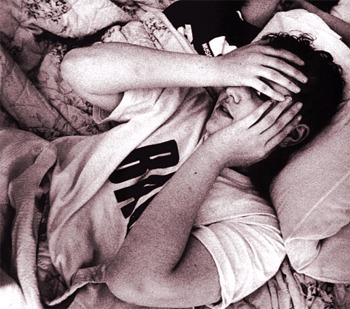
A Voice for Social Change
Written by Ann Jackman | Posted by: Anonymous
The daughter of schoolteachers, Lazarus graduated from Vassar and from Boston University with a degree in communications and a desire to change the world. "I had this naive notion that if I put things in the media, people would see it and want to change." She put that idealism to work as one of a handful of female producers at a Boston television station, but soon found herself frustrated by a management distrustful of her wish to explore such controversial topics as the Vietnam War. "People were so concerned with getting ahead and being promoted that they didn’t want to confront the status quo. I was so out of the loop, I didn’t know." Lazarus realized that the only way to have her voice heard was through independent documentaries.
With inspiration and encouragement from women mentors, including China Altman, the first woman Associated Press (AP) reporter, and Betsey Hogan of the National Organization of Women (NOW), Lazarus became interested in women’s health issues, including advertising images in doctor’s office magazines that depicted women as chairs and fixtures. Fueled by the money earned from selling a Porsche they had refurbished, Lazarus and Wunderlich made their first film, "Taking Our Bodies Back" in 1974, and it "took off like wildfire," said Lazarus. The film dealt with previously unaddressed topics such as abortion, VD, and breast cancer misconceptions, and helped to catalyze the women’s health movement. With the encouragement of another female mentor, filmmaker Joyce Chopra, Lazarus decided to distribute the film herself, and thus Cambridge Documentary Films was born.
Lazarus started making films in the heyday of the women’s movement in the 1970s, and many of those films were among the first to tackle the way that society perceives women and how women perceive themselves within society. In fact, most of Lazarus’ films are "firsts" — the first film about the women’s health movement, the first film about the degrading images of women in advertisements ("Killing Us Softly," 1979), the first film to address homophobia ("Pink Triangles," 1982), and the first to explore the definitions and mythologies surrounding rape ("Rape Culture," 1975).
Lazarus has always considered herself a social activist. She just happens to use film and video as the medium to spread her message. Her films give voice to issues and people often silenced by a society fearful of change. Other topics she has covered include alcohol in advertising, the power of trauma and recovery, the threat of nuclear weapons, and a profile of socialist movement leader Eugene Debs, which used animated images and photos long before Ken Burns.
In 1993, invited to shoot some video at Framingham Prison, Lazarus interviewed eight women incarcerated for murdering their abusive husbands, and quickly realized she had a powerful film on her hands, one dealing with an issue previously avoided by the domestic violence movement because of its complicated nature. "Defending Our Lives," went on to win an Oscar for best documentary short, an experience Lazarus says was "wild, surreal, and exciting. I almost fainted when we won." The award helped open doors to get meetings, but more importantly it opened eyes to the long hidden trauma of domestic violence and its consequences.
Each of Lazarus’ films is funded through the distribution earnings of the previous film, and often the ideas for a new film stem from audience feedback, an element Lazarus finds crucial to documentary filmmaking. "The most effective use of a documentary comes in the discussion and exchange of ideas that happens afterwards." According to Lazarus, the promotion of dialogue is the ultimate power of documentaries. Making time for that dialogue is a tricky matter, however, so Lazarus and Wunderlich try to keep their films as short as possible ("it is a misery to try and get them down to 30 minutes," Lazarus jokes), and they also include study guides and sample questions with each film.
Her current film, "Rape Is…" is sure to generate a lot of discussion. It looks at both the positive changes and the lack of progress in the 17 years since "Rape Culture" first explored the topic. With this film, "we want to expand the definition of rape and show how all the different forms are related." The film looks at acquaintance rape, child abuse, prison rape, and prostitution around the world, calling rape a global human rights problem. It features interviews with victims and activists, such as Eve Ensler, the author of "The Vagina Monologues."
The film has appeared in several festivals and received high praise for its poetic style, but Lazarus worries that the nature of the subject matter might present an insurmountable barrier for potential viewers. "Unlike some documentaries, this one hits close to home. Many women have to deal with the possibility of being raped and men have to deal with their role in a society that conditions them towards predatory behavior." She fears that people will treat this film the same way they treat the issue of rape — through avoidance, silence and denial. "I want everyone to see it and I wish there was a way to make it so people were motivated to overcome their initial reluctance."
Reluctance is a common response to change, and Lazarus has been confronting it with each landmark film she produces. In the past 25 years, she has seen some progress in the form of increased support services and greater attention to domestic violence, rape, and women’s health issues. But unfortunately, with change, comes backlash from those clinging to "a cultural pressure to stay within the old morality," says Lazarus. "Women’s rights, children’s rights, and minority rights represent a new morality that threatens an older power structure that doesn’t want to be demolished. Transformative issues always run up against this power structure. They claim everything’s fine and we’ve fixed the problems, but we haven’t yet."
And despite an increase in interest and viewing options for documentaries, Lazarus laments the fact that there is still a lack of courageous independent voices and visions. "You need people to take a chance, otherwise you get the same old-same old." Nearly 30 years since her first film, Margaret Lazarus is still taking chances. She is currently working on two projects, one that will examine revenge and hatred, and another aimed at teaching children about race, gender and class.
Although Lazarus claims that years ago, she was naive to think she could change the world, she still believes that documentaries can have a powerful impact as long as they generate discussion. "Nothing is as wonderful as a piece of powerful media and someone who is an activist or educator that wants to bring about change. Learning happens when people make ideas their own, rather than just sit and watch." Documentaries do have the power to change our viewpoint, change our behavior, and maybe, as Lazarus hoped many years ago, even change the world, as long as we become active participants and not passive viewers. Margaret Lazarus and Renner Wunderlich continue to knock us out of this passivity with films that force us to take part in challenging journeys.
Information on CDF and its films can be found at http://www.cambridgedocumentaryfilms.org/
'Rape Is...' will screen at the MFA on September 12 at 6:00 PM and on September 14 at 1:15 PM. The website for the film is www.rapeis.org. Information on CDF and its films can be found at http://www.cambridgedocumentaryfilms.org/












